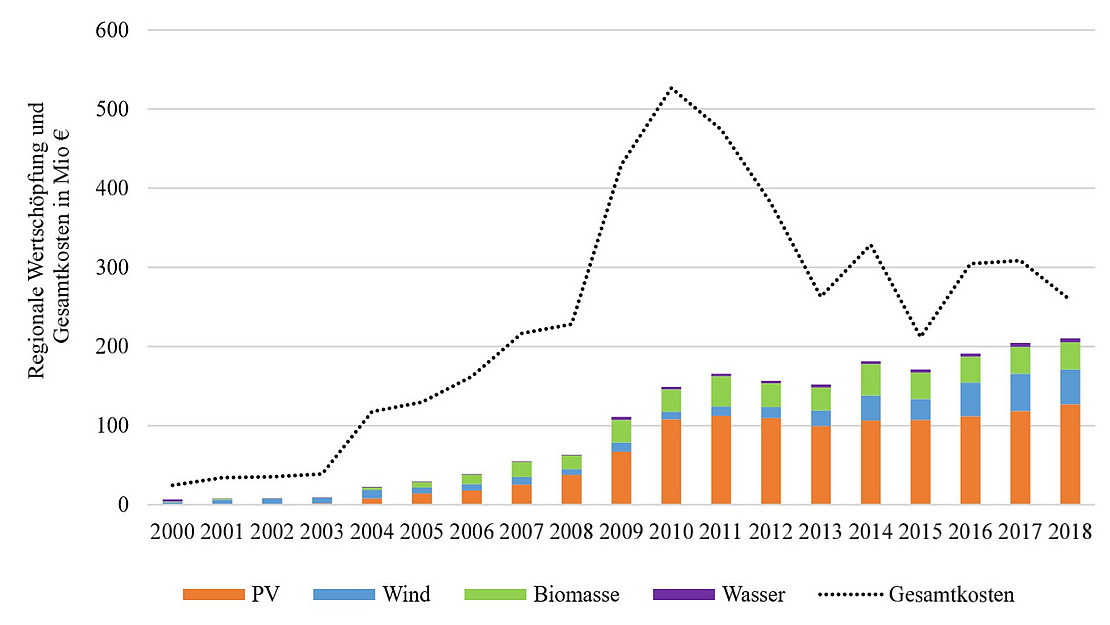This page contains automatically translated content.
Billions for North Hesse
 Image: University of Kassel.
Image: University of Kassel.To calculate the regional value added, the research team from the Department of Economics with a focus on decentralized energy management (Prof. Dr. Heike Wetzel) analyzed the economic procurement and utilization chains of renewable energy projects. In the process, the researchers came up with impressive figures: In the period from 2000 - 2018, about 4.47 billion euros were allocated to renewable energy projects in the power sector in Northern Hesse. Around 43 percent of this remained in the region as part of regional value creation - equivalent to a sum of 1.93 billion euros.
"The region of Northern Hesse has already achieved above-average results in the expansion of renewable energies in the electricity sector: with a share of renewable energies in electricity consumption of almost 56 percent, this is higher than the share in Germany with 37.8 percent and in Hesse with 22.2 percent - this is shown by the figures from 2018," says study director Dr. Ines Wilkens.
As far as regional value creation is concerned, the lion's share is accounted for by photovoltaics - which accounts for around 61 percent of value creation. What surprised the researchers: Wind power only comes in third place, preceded by value added from biomass. "Since the expansion of wind power only took place more intensively from 2014, the effects could only be included in the overall result for a few years; here, increasing contributions to regional value creation can be expected for the coming years," Dr. Wilkens elaborates.
But what the figures also show: The expansion of photovoltaics has declined sharply since 2013, so that the regional value added by this technology, which is still high now, is expected to decline sharply from 2033. The same applies to wind energy, with currently very low rates of expansion. "In order to achieve the goals of the federal government, but also of the state of Hesse for the energy turnaround, new impulses are therefore needed here to stimulate investment in renewable energy plants more strongly again," emphasizes Prof. Dr. Heike Wetzel.
She believes that North Hesse is on the right track: "With the decision of the Regional Management North Hesse for an Energy Transition Charter, a broad alliance of business and politics has set ambitious goals for the implementation of the energy transition. By 2040, the 100 percent renewable energy supply is to be achieved in the areas of electricity, heat and mobility."
The study was financed by cdw Stiftung gGmbH from Kassel. "Northern Hesse has a concentrated competence for the energy transition from the fields, science, politics and business," said Thomas Flügge, managing director of the cdw Foundation. "From this point of view, it is right that we move forward in the expansion of decentralized, climate-friendly energy supply. The clarity with which the University of Kassel has confirmed the economic benefits for the region is an important building block in gaining acceptance for the measures ahead."
The study is available online at:
http://www.uni-kassel.de/go/RWS_Nordhessen
Link to the North Hesse Energy Transition Charter:
https://www.deenet.org/energiewende-charta-nordhessen/
Contact:
Dr. Ines Wilkens
Ines.wilkens[at]uni-kassel[dot]de
Prof. Dr. Heike Wetzel
Heike.wetzel[at]uni-kassel[dot]de